Table of Contents
Preparing for a job interview is crucial because it increases your likelihood of securing the emergency room (ER) RN job. Effective and thorough preparation helps a candidate present themselves with confidence, clearly articulate their skills and experiences, and respond effectively to the questions. By practicing potential interview questions, an RN can refine their answers, reduce their anxiety, and demonstrate they are the best candidate for the job.
Preparation reflects positivity on a candidate’s enthusiasm and performance, and it will leave a good impression on the potential employer. In a competitive job market, being prepared can elevate a candidate above fellow candidates.
Preparing for your interview involves anticipating questions about both your technical knowledge and skill set. Here are 20 potential interview questions along with potential answers:
Why did you want to be an ER nurse?
Answer: “I love the dynamic nature of emergency medicine and that it requires critical thinking at a rapid pace. I enjoy the variety of unique patient cases that present in the ER and making a difference in patients’ lives.”
How do you handle high-stress situations in the ER?
Answer: “I remain calm, prioritize my tasks, and involve the team. Clear communication and delegation are needed to keep the team calm and everything under control.”
How do you prioritize patients in a busy ER?
Answer: “I follow the triage system by prioritizing life-threatening conditions like cardiac arrest or severe trauma first and ensuring stable patients are monitored and cared for in a timely manner.”
A patient presents in the ER with chest pain—what do you do?
Answer: “First, assess their vitals, administer oxygen if needed, perform an ECG, start an IV, draw blood for cardiac markers, and notify the physician while preparing for an emergency intervention.”
How do you handle a patient in respiratory distress?
Answer: “Quickly assess the airway, administer oxygen or use a non-rebreather mask, and prepare for intubation if necessary. I’d also monitor for underlying causes like asthma, pneumonia, or anaphylaxis and treat accordingly.”
What emergency medications are you experienced with?
Answer: “I have experience with epinephrine, nitroglycerin, atropine, naloxone, amiodarone, and rapid-sequence intubation drugs, among others. I understand proper dosage is vital and patients must be monitored for adverse reactions.”
What steps do you take during a Code Blue?
Answer:“I immediately begin CPR, call for backup, prepare defibrillation if needed, administer a medication like epinephrine, and communicate effectively with the team for a coordinated effort.”
Describe a time you had to make a quick decision in the ER.
Answer: “A patient showed signs of sepsis, so I quickly started IV fluids, drew blood cultures, and administered broad-spectrum antibiotics. My quick reaction prevented further deterioration and improved the patient’s outcome.”
How do you handle a combative or uncooperative patient?
Answer: “I remain calm, use de-escalation techniques, and listen to their concerns. If needed, I involve security to ensure the staff’s safety while we provide care.”
Tell me about a time you managed a high patient load.
Answer:”During the COVID-19 pandemic, we had an influx of patients. I had to prioritize the critical cases, delegate tasks to the team, and maintain communication so all patients received timely care.”
Describe a time you made a mistake and how you handled it.
Answer: “I once miscalculated a medication dose but realized it before administration. I immediately informed my supervisor, corrected the error, and reviewed protocols to prevent future mistakes.”
How do you handle anxious family members in an emergency?
Answer:“I provide clear updates, reassure them, and answer questions as I can.”
Have you ever trained or mentored a new nurse?
Answer: “Yes, I have acted as a preceptor for new nurses by guiding them through protocols, offering hands-on training, and providing constructive feedback to build their confidence.”
How do you handle a disagreement with a colleague?
Answer:“I focus on patient care first, address their concerns professionally, and clarify any misunderstandings later in a calm and respectful way.”
How do you stay updated on emergency medicine best practices?
Answer:”I attend continuing education courses, read medical journals, and obtain additional certifications like X.”
How do you handle a patient who refuses treatment?
Answer:“I educate them on the risks, respect their autonomy, document their decision, and involve social services or ethics teams if needed.”
What would you do if you suspected a case of abuse?
Answer: “I would document my findings and report it to the appropriate authorities as per hospital protocol.”
How do you maintain patient confidentiality in a busy ER?
Answer: “I discuss patient information privately, use secure electronic health records, and ensure that only authorized personnel have access to patient information.”
What would you do if you witnessed a colleague making a serious mistake?
Answer: “I would step in immediately if patient safety was at risk, address the issue with the colleague, and escalate it if necessary for proper patient care.”
How do you handle end-of-life situations in the ER?
Answer: “I provide compassionate care, support the family, and follow advance directives or DNR orders as per hospital policy.”
Interview preparation is key to a strong, first impression. By practicing possible interview questions, an RN can improve their communication skills, reduce their anxiety, and convey their qualifications for their desired ER position. Preparation will help boost your confidence and demonstrates your commitment and professionalism. Being well-prepared is an important step toward career success as an ER RN.




